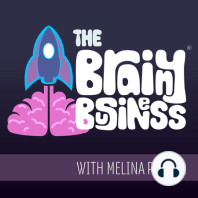50 min listen

98. Behavior Change at WW and Beyond, an Interview with Dr. Julie O’Brien
FromThe Brainy Business | Understanding the Psychology of Why People Buy | Behavioral Economics
98. Behavior Change at WW and Beyond, an Interview with Dr. Julie O’Brien
FromThe Brainy Business | Understanding the Psychology of Why People Buy | Behavioral Economics
ratings:
Length:
52 minutes
Released:
May 1, 2020
Format:
Podcast episode
Description
Today, I am very excited to introduce you to Dr. Julie O’Brien, a behavioral scientist applying concepts from behavioral economics in business. In today’s episode, we talk about research Julie has done herself or is particularly interested in, both as part of her time as a principal behavioral scientist at the Center for Advanced Hindsight at Duke University (which, for those of you who don’t know, is lead by Dan Ariely, one of the best known behavioral economists in the world. He wrote Predictably Irrational and several other books I reference often on the show. Julie is currently the Director of Behavior Change at WW. I so enjoyed talking to Julie about all the amazing work she has been doing on bringing behavioral science out of the lab and testing things within real businesses – and I love all the practical applications of behavioral economics being applied to health and fitness. As many of you know, one of my top 3 goals is centered around health and I have been training up for a half marathon (admittedly, with some gaps recently…but back on the train!) as well as using my Peloton as I mentioned in the show. Julie talks a bit today about some research using the peak-end rule in health and fitness as well as so many other concepts and fascinating applications for behavioral economics. We touch on a lot of concepts in the conversations, and there are links to nearly all of them, including the episodes on memory biases, the peak-end rule, habits, goals, counterfactual thinking, the overwhelmed brain, optimism bias, fundamental attribution error, how to set up your own experiments, and more. We behavioral economists are working to help businesses to use and implement the learnings from the field to have stronger communication, and that is a big reason this podcast exists – to help you understand the concepts on a deeper, and more applicable level so you can try them out. Show Notes: [03:24] Julie is a behavioral scientist with many experiences. [05:17] Julie did many different projects including traditional academic lab studies and applied field interventions at Duke University’s Center for Advanced Hindsight. [06:45] They ran an experiment to understand the emotional experiences people have when they are faced with a medical decision. [08:28] They were interested in what happens to people when they learn about the details of this kind of colon cancer surgery. [11:12] They looked at the data and found the disgust emotional reaction that participants had after learning about the colostomy bag is what actually reduced their ability to remember information. [13:04] We probably can’t (and shouldn’t) remove emotions from medical decisions completely, so we have different strategies to help people make the right choice. [15:16] It raises interesting questions around nudge vs. shove and do we want to be making a judgment about what is actually rational in this case. [16:22] It is all these different pieces of behavioral science. It is never just one concept at play. In this case, we have prefactual thinking, an overwhelmed brain, and different pieces of nudging. [17:18] One of Julie’s favorite studies was Zach Zenko and Dan Ariely’s study on how to get people to love exercise. [18:04] Zach and Dan’s question was how could we reshape the exercise environment to make it more enjoyable or to make it feel more enjoyable so that people would be interested in repeated exercise. [18:16] Often behavioral scientists look at the world as it is now and say if we were to assume that this is not the optimal design, how might we change the design to make it more optimal. [20:37] Just by changing the way that we structure that workout we can actually change the way that people think about the workout which then influences their interest in repeating the workout. [23:27] Julie and her colleagues did a study where they showed you could keep the baseline physiological sensation the same but you could change the way people inte
Released:
May 1, 2020
Format:
Podcast episode
Titles in the series (100)
21. Habits: 95% Of Decisions Are Habitual - Which Side Is Your Business On?: Habits are much more powerful than most of us realize. This behavioral economics podcast is about habits and habitual buying. It is another one of my behavioral economics foundations podcasts. When a lot of us think of habits, we focus on bad habits,... by The Brainy Business | Understanding the Psychology of Why People Buy | Behavioral Economics